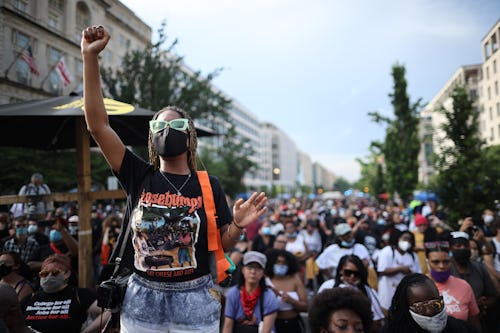
When Walmart released its Juneteenth ice cream, the outrage was immediate. Not only was it the exact same flavor combo as Black woman-owned Creamalicious's red velvet and cheesecake ice cream, but it also represented the bald commodification of the holiday's spirit. Walmart eventually issued an apology and removed the product from its shelves.
But Walmart isn’t the only organization that has landed in hot water for its food-based Juneteenth mess-ups. There was also the Children's Museum of Indianapolis, which offered up a watermelon salad as part of its Juneteenth spread, invoking an offensive stereotype. They, too, faced public outcries and had to backtrack their ill-conceived plans. These businesses seem to go through the motions of appearing inclusive, but their surface level understanding of Juneteenth instead disrespects the history of and meaning behind the holiday in the first place.
This perversion of Juneteenth isn’t surprising. In his 2022 book Elite Capture: How the Powerful Took Over Identity Politics (And Everything Else), author Olúfẹ́mi O. Táíwò outlines how cultural touchstones and values become co-opted by those in power to their own ends. "Elite capture happens when the advantaged few steer resources and institutions that could serve the many toward their own narrower interests and aims," he wrote. When President Joe Biden signed the Juneteenth National Independence Day Act into law in 2021, making it a federal holiday, Juneteenth became more visible outside of the African-American community. It was only a matter of time before it was used for corporate posturing, as often happens when lesser-known cultural celebrations become mainstream. So it’s not surprising that Juneteenth would experience the same fate as MLK Day and Pride month — robbed of their potency for the purpose of profit. Why would anyone assume, based on how our society operates, that Juneteenth would be done justice in the first place?
Juneteenth's power lies in its ability to not only draw people together, but also educate them about the fact that the end of slavery was something that required a long, hard struggle.
Juneteenth is a bittersweet celebration. It commemorates the day — two months after the end of the Civil War, and two years after the Emancipation Proclamation abolished slavery in Confederate states — that enslaved folks in the farthest reaches of the Confederacy learned they were free. On June 19th, 1865, Maj. General Gordon Granger traveled to Galveston, Texas to share General Order 3 and enforce the freedom granted to Black folks in the area by the Emancipation Proclamation, announcing:
“The people of Texas are informed that, in accordance with a proclamation from the Executive of the United States, all slaves are free. This involves an absolute equality of personal rights and rights of property between former masters and slaves, and the connection heretofore existing between them becomes that between employer and hired labor. The freedmen are advised to remain quietly at their present homes and work for wages. They are informed that they will not be allowed to collect at military posts and that they will not be supported in idleness either there or elsewhere.”
In places like Texas, Juneteenth is a large cultural touchstone and has been recognized as a state holiday since 1980. Scott Heath, the Director of the Program in Black Studies at Loyola University New Orleans, underscores the tension around celebrating a holiday that is about freedom, but also about acknowledging the theft of time and labor from Black folks. "I've been trying to figure out the appropriate emotional stance with regard to Juneteenth," he tells Mic.
The story of Juneteenth is complicated. "We know even after Granger made the announcement, it didn't automatically mean everybody could just go," Heath says. According to General Order 3, the formerly enslaved were encouraged to stay and work as "hired labor" on the same plantations where they were once considered property. That crucial information about freedom reached people late — a reflection of how then, as now, the flow of information can have an outsized impact on people's freedom.
Juneteenth's power lies in its ability to not only draw people together, but also educate them about the fact that the end of slavery was something that required a long, hard struggle. "You can change the law, but it doesn't change custom automatically, there was resistance," Heath says. Without proper enforcement of the Emancipation Proclamation, freedom was still tenuous.
Heath points out that documents like the Declaration of Independence, the Constitution, the Bill of Rights, and even the Emancipation Proclamation are still being debated. "One thing about amendments, to me, is that they are amendments,” he says. “An amendment means a change. Amendments are reminders that these constitutive documents can be revised, and they have been revised 20-something times."
And we still see the precarity of what it means to negotiate personhood in this country. Recent attacks on abortion rights, LGBTQ+ rights, and the ongoing social and racial justice struggles are a reminder that freedom still very much requires a fight. Juneteenth as a holiday represents an opportunity to remember not only what is gained, but also what must still be protected. It’s why it’s a slap in the face when companies like Walmart, with their own histories of egregious labor violations, attempt to co-opt an African American holiday to hawk ice-cream. The spirit of Juneteenth is in celebrating freedom, not padding a mega corporation's bottom line.
Instead of allowing the holiday to be used to sell products or give federal workers yet another day off, we can look to Juneteenth to inform us of how to move forward in a world that seems increasingly uncertain by the day. We can gather with our loved ones, like the formerly enslaved did, and also organize to work for and create the world we want to live in.







